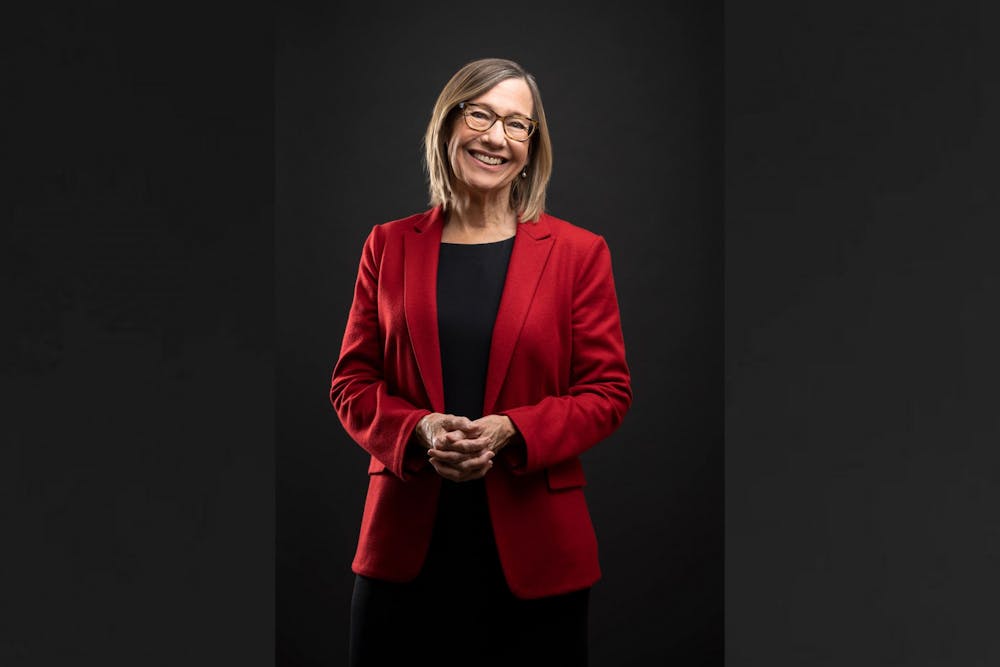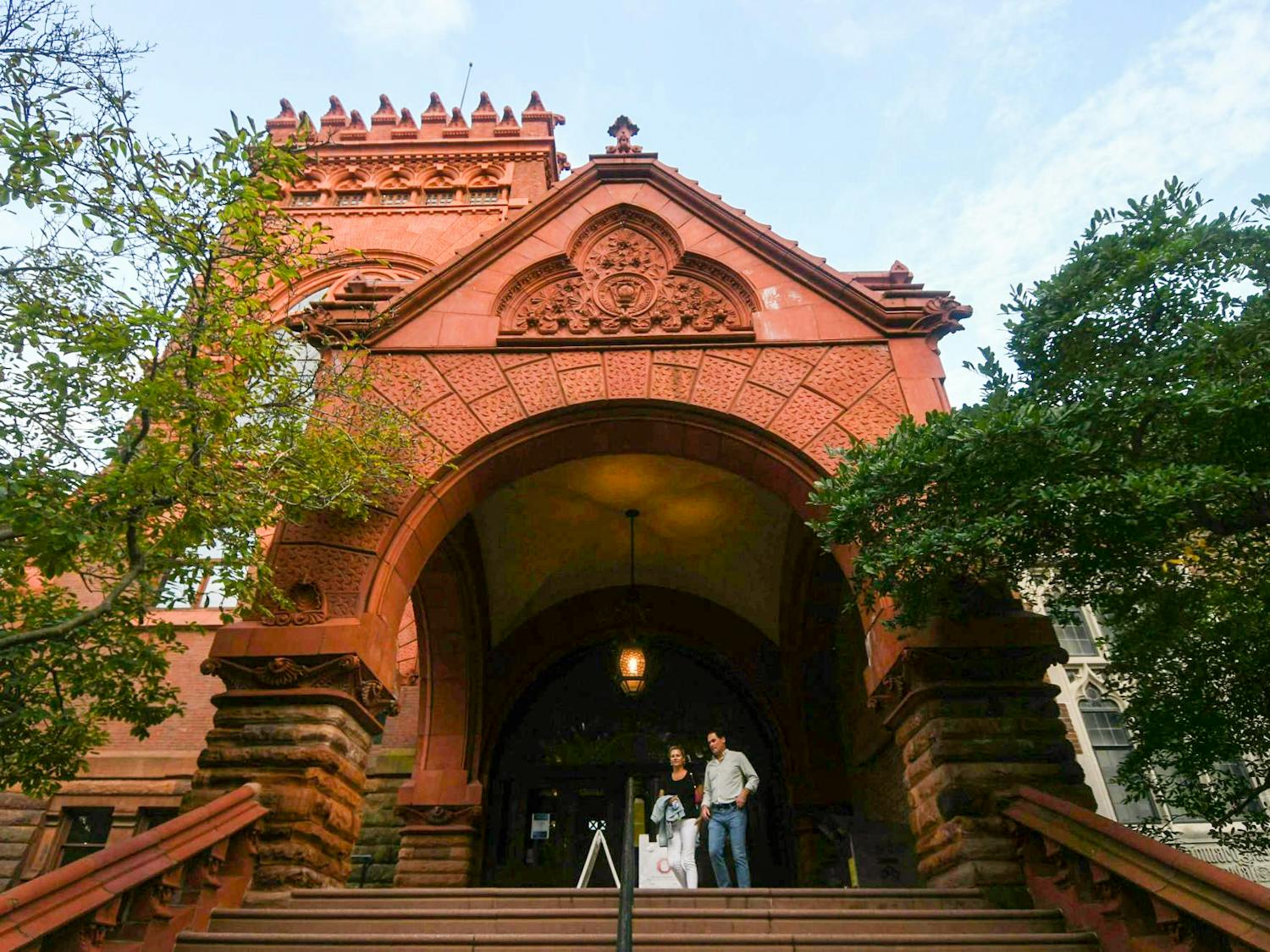As her tenure as dean of Penn's Graduate School of Education comes to an end in June, Pam Grossman said that she has been guided by a vision of making GSE a hub for impact in the education profession.
Grossman arrived at Penn as dean in January 2015 after teaching at Stanford University. During her tenure at GSE, she has appointed more than a third of the current standing faculty, increased the size of the GSE student body by 24% in the last four years, doubled revenue, and increased faculty and student diversity. GSE also reached No. 1 in the U.S. News & World Report's ranking of education schools and is nearing the end of a milestone expansion project, which will bring all of the school's facilities under one roof.
The Daily Pennsylvanian spoke with Grossman, her colleagues, and GSE students about how GSE has changed in the past eight years. The people that the DP spoke with highlighted the school's new innovation programs, its inclusivity initiatives and first-ever need-based financial aid program, and the expansion of partnerships with West Philadelphia schools.
“We're not here just to produce research, but to produce research that has an impact in the world, to create greater educational opportunities, and use education as a way to create a more equitable world,” Grossman told the DP in an interview.
During her tenure, Grossman established the Center for Professional Learning to create opportunities for people beyond the GSE community to learn from faculty. More recently, she solicited the largest gift ever for the McGraw Center for Educational Leadership and the Center for Global Education Innovation, Catalyst@Penn GSE. The centers will unite educational leaders to engage in learning and tackling new challenges in education, such as the role of artificial intelligence, Grossman said.
Caroline Watts, who leads GSE's Office of School and Community, said that Grossman brought a focus on sustainability and innovation and moved GSE’s impact from “single-school to broader scale involvement."
In addition to responding to modern educational needs, GSE Deputy Dean Matthew Hartley said Grossman is cognizant of how GSE can broaden its reach to new audiences. The school now provides need-based financial aid provided for students who previously would have been unable to afford a Penn education, Hartley said, adding that GSE's financial aid budget of GSE has tripled during Grossman’s tenure.
“I’m an international student who is on [a] scholarship, without which I would not be here,” GSE Student President Dawn Adrian said. “The fact that we're opening up more avenues for GSE students to study here is amazing.”
RELATED:
Dr. Carolyn Ureña appointed College director of Academic Advising
New Penn Women's Center director talks with DP about plans for center's 50th anniversary
Grossman has also focused on increasing diversity among students and faculty. 48% of professors and 45% of the domestic student body are people of color, and 40% of the school's total enrollment comes from international students.
Beyond the walls of GSE's campus, students, professors, and administrators said that Grossman has made GSE more involved in Philadelphia. Across the city, GSE is now in partnership with more than 200 schools and involved in more than 400 activities and initiatives.
Wendell Pritchett, who worked with Grossman when he was provost and then interim president, said he found pride in her engagement at the local, national, and global levels.
“She’s a transformational leader," Pritchett said.
GSE's extensive reach has also forced Grossman to confront a range of challenges in higher education — including the COVID-19 pandemic and political discourse about academic free speech and affirmative action.
“It was tumultuous in a lot of ways, but also a time of enormous learning,” she said.
Elizabeth Dunens, a fourth-year Ph.D. student at GSE, said that she appreciated Grossman's leadership during difficult times. In the early stages of the pandemic, GSE took what Dunens called “student-centered” actions, such as offering pass-fail options and ensuring that funding and support remained available.
“It meant a lot that she reached out to our GSE community after the murder of George Floyd, the Jan. 6 insurrection, and the violence against the AAPI community,” Dunens said. “She is transparent and genuinely cares as a leader and educator.”
Hartley said that Grossman has been successful because of her ability to connect people within GSE, and a commitment to building a positive community. Pritchett called Grossman particularly adept at engaging faculty, staff, and students with their work, while Annenberg School for Communication Dean and Provost-elect John Jackson wrote to the DP that Grossman was inspiring to work with in administration.
Grossman will be succeeded by Michigan State University professor Katharine Strunk, who took a class taught by Grossman at Stanford. After she passes the torch, Grossman said she looks forward to spending more time with family and continuing a research project in Thailand.
She said that she is proud of the community and the current working infrastructure at GSE, which she said fosters a sense of collaboration and allows the school to be responsive.
“All of these were collective achievements,” she said. “I've been really privileged to work with such an incredibly talented and passionate group of people.”
Editor's Note: The article has been updated to reflect the following corrections:
- GSE's student population has grown by 24% in the last four years. It has doubled since 2001.
- Dean Pam Grossman doubled revenue during her tenure, rather than tripling it.
- The Center for Professional Learning allows people from beyond the GSE community to learn from faculty, rather than providing career opportunities for students.
- Dean-elect Katharine Strunk took a class taught by Grossman at Stanford.









